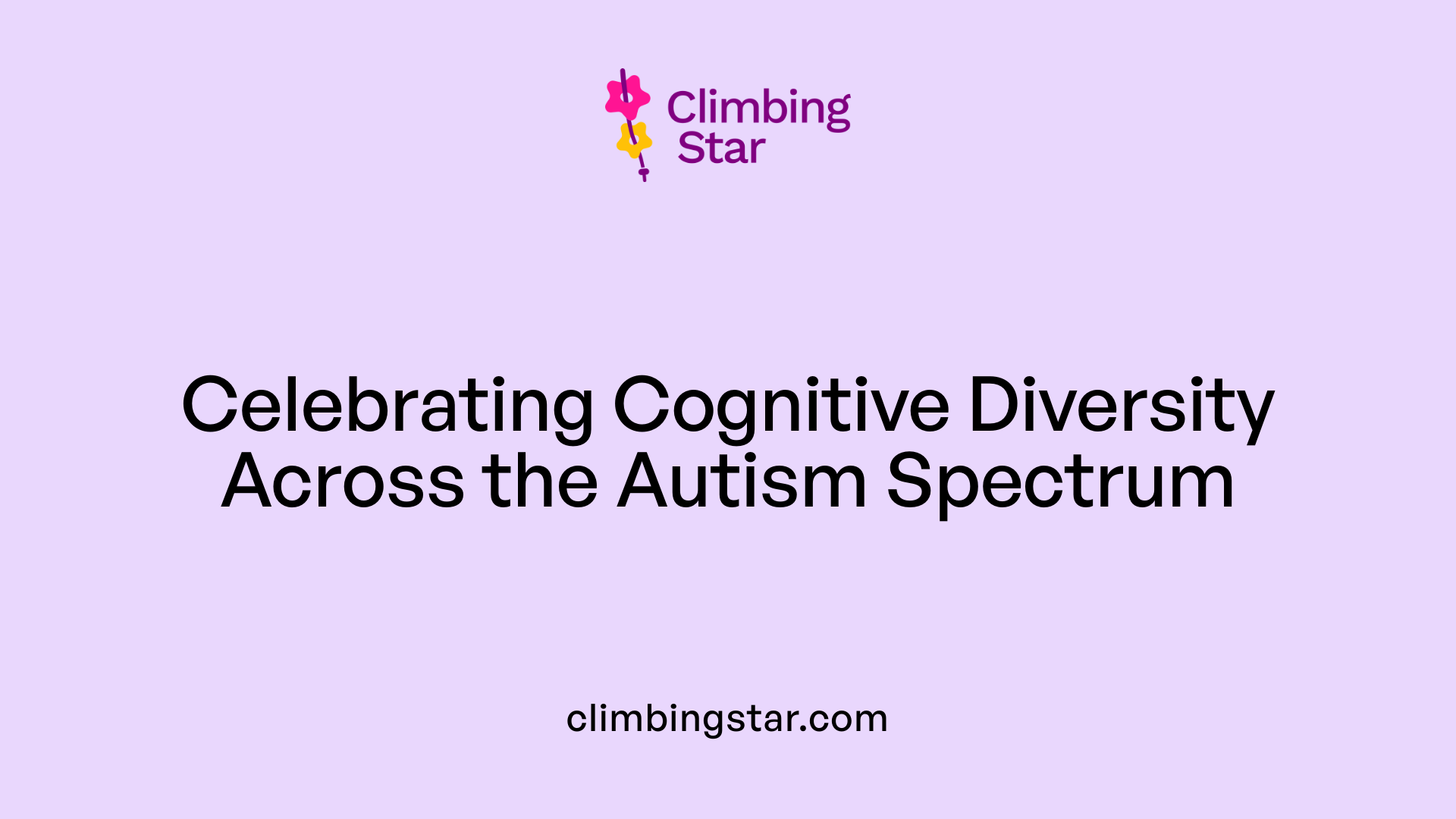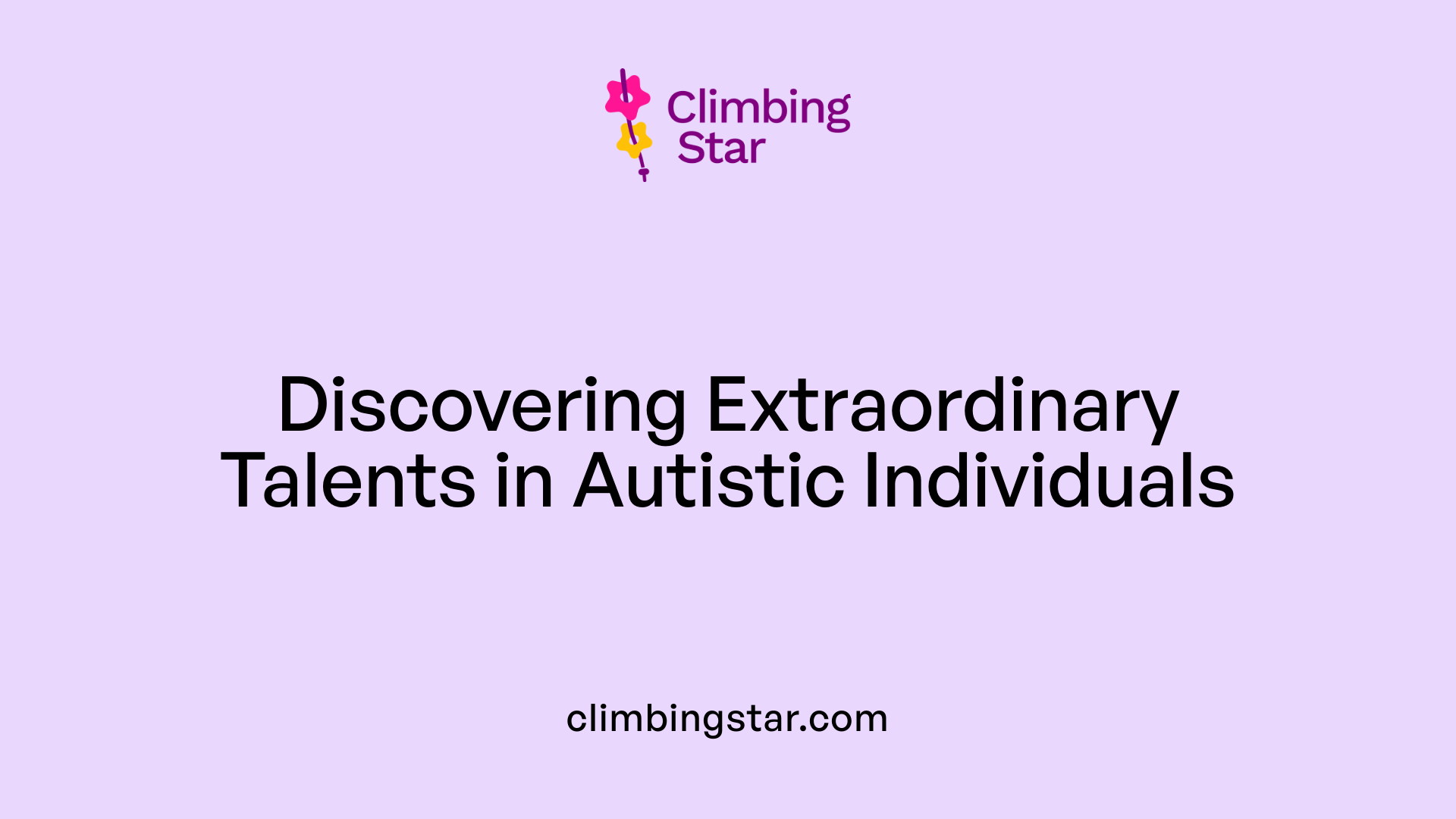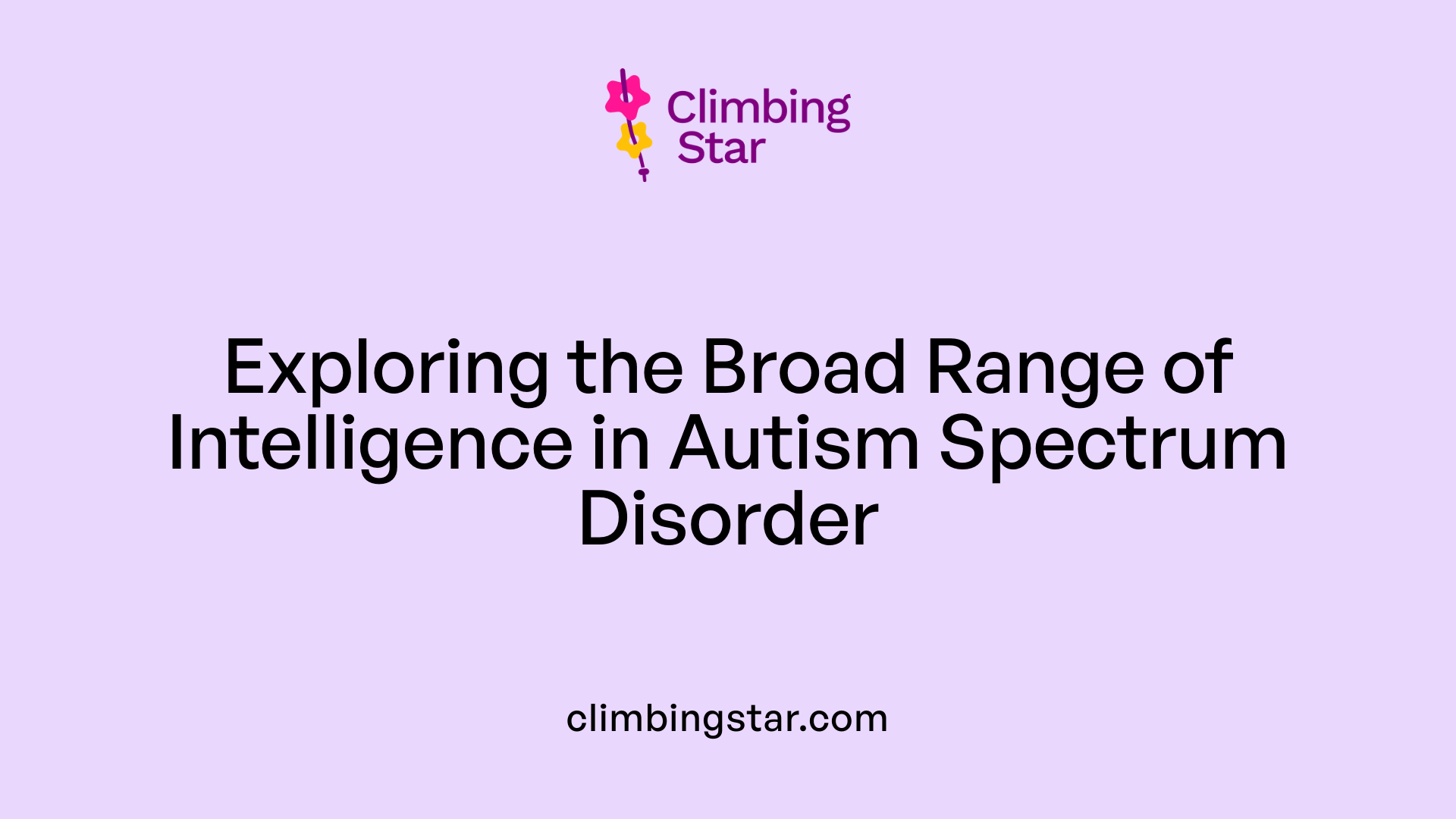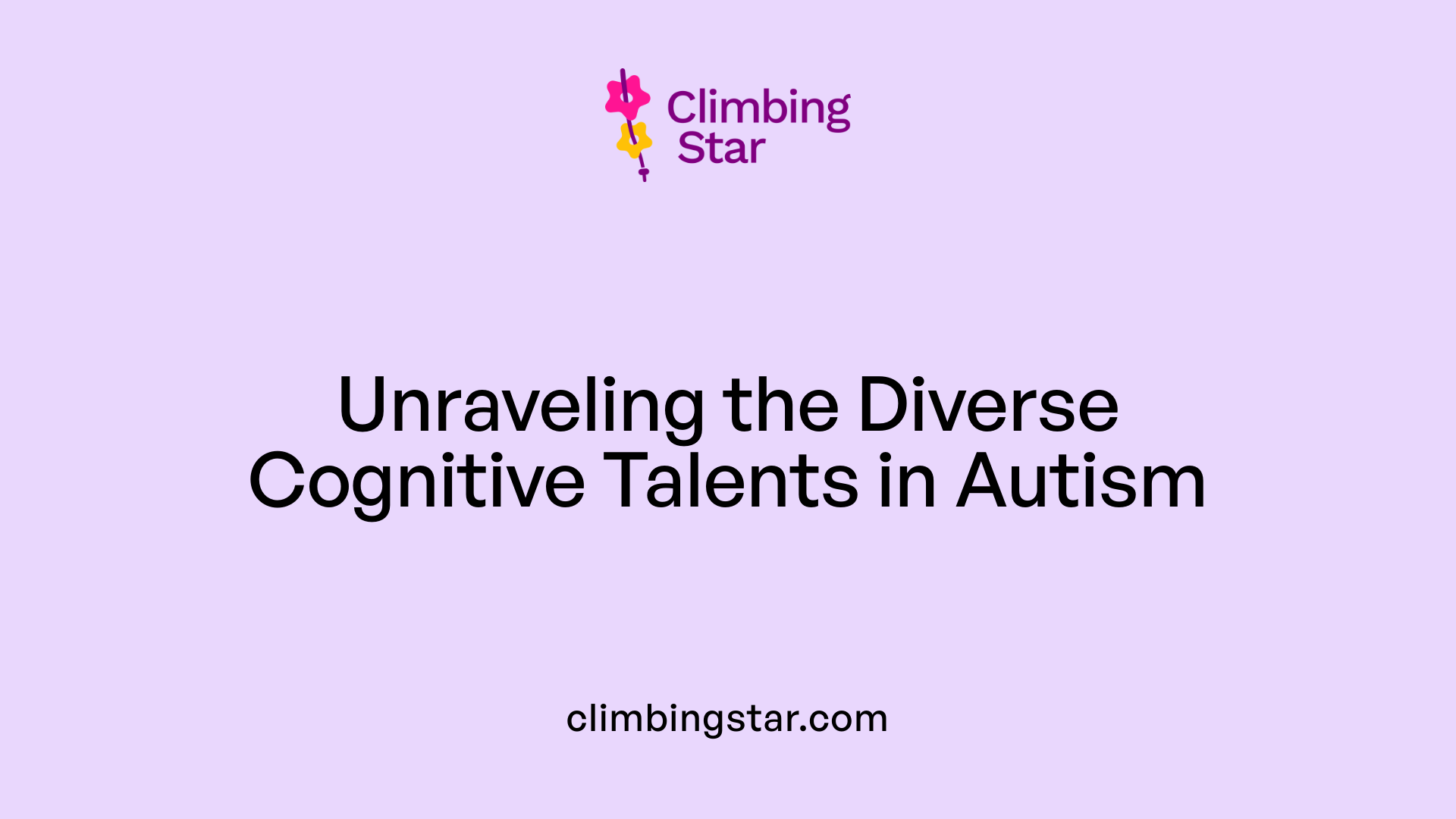Understanding the Relationship Between Autism and Intelligence
The question 'Are autistic people smart?' often arises amidst misconceptions and stereotypes. To address this comprehensively, we explore the diversity of cognitive abilities among autistic individuals, challenge myths, and illuminate scientific findings that reveal a nuanced picture of intelligence within the autism spectrum.
Autism and the Spectrum of Cognitive Abilities

What does cognitive diversity look like among autistic individuals?
Autistic individuals exhibit a broad spectrum of intellectual abilities, making cognitive diversity a defining feature of autism. Some may face intellectual challenges, with IQs below 70, while others demonstrate remarkable talents and high intelligence, sometimes even reaching gifted or genius levels.
This range is not just about academic scores but also about the kind of skills and strengths they possess. Many autistic people excel in problem-solving, pattern recognition, attention to detail, and memory. These strengths often translate into exceptional abilities in areas such as musicality, visual-spatial reasoning, logical-mathematical thinking, and verbal-linguistic skills.
Research indicates that autism is not inherently linked to lower or higher intelligence. Instead, it reflects a heterogeneous population with varied cognitive profiles.
How broad is the range from intellectual disabilities to giftedness?
The majority of autistic individuals, estimates suggest around 70%, have an intellectual disability characterized by an IQ below 70. However, about 30% of autistic people have average to high intelligence.
More specifically, recent studies shed light on the higher end of this spectrum. A 2016 CDC report noted that approximately 42% of autistic children had IQ scores of 86 or above. A subsequent study in 2023, analyzing records of over 30,000 individuals, suggested this proportion could be as high as 59%, indicating a significant number of autistic individuals with average or superior intelligence.
Among those with higher IQs, many demonstrate strengths in multiple intelligence domains, including visual-spatial, logical-mathematical, and verbal skills. Individuals with Asperger’s syndrome or high-functioning autism often have IQ scores within the normal or even gifted ranges, despite facing social and emotional challenges.
How do neurological and environmental factors impact cognitive abilities?
Genetics and brain structure play essential roles in shaping the intelligence of autistic individuals. Certain genes associated with autism also share a positive correlation with high intelligence, suggesting some biological pathways favor the development of advanced cognitive skills.
Neuroanatomical differences, such as altered brain connectivity and variations in brain structure, can enhance particular cognitive functions. For example, atypical connectivity patterns may support superior pattern recognition and visual-spatial reasoning skills.
Environmental influences, including supportive educational environments and targeted interventions, can help autistic individuals reach their full potential. Creating inclusive and accommodating surroundings enables those with diverse cognitive profiles to thrive and develop their talents.
The complexity of intelligence in autism
It’s important to understand that autism and intelligence are separate characteristics. A person can be autistic regardless of whether they have an intellectual disability or are highly gifted.
Autistic individuals often exhibit cognitive strengths that complement their challenges. For example, they might possess exceptional memory, hyperfocus on specific interests, or heightened attention to detail.
However, traditional IQ tests might not fully capture their abilities, especially in areas like visual-spatial or pattern recognition skills. This underscores the importance of using alternative assessment methods to understand their true potential.
Gender differences and social implications
Research also highlights gender differences in cognitive profiles. Boys with autism tend to have higher IQs more frequently than girls, who often mask their traits and social difficulties.
Despite intellectual strengths, many autistic people, especially those with high-functioning autism or Asperger's syndrome, experience social and emotional delays. They may appear naive or unaware of social cues, which can lead to misunderstandings or social isolation.
Overview table of cognitive abilities in autistic individuals
| Cognitive Profile | Typical Range of IQ | Common Strengths | Notable Challenges |
|---|---|---|---|
| Intellectual Disability | Below 70 | N/A | Significant learning challenges |
| Average IQ | Around 85-115 | Problem-solving, memory, attention to detail | Social-emotional delays, sensory sensitivities |
| Gifted or Genius | Above 130 | Pattern recognition, logical reasoning, creativity | Sensory overload, social difficulties |
Final thoughts
Autism encompasses a spectrum of cognitive abilities, underscoring the importance of personalized approaches to education and support. Recognizing strengths and challenges allows for better resource allocation and encourages environments where every individual can excel in their unique way. The relationship between autism and intelligence is complex but highlights the vast potential within this diverse population.
Exceptional Talents and Savant Skills in Autism

What is the diversity of cognitive abilities among autistic individuals?
Autistic individuals exhibit a broad spectrum of cognitive abilities, ranging from intellectual disabilities to exceptional talents. This diversity is a fundamental aspect of autism, emphasizing the importance of understanding it as a neurodiverse condition.
Many autistic people have strengths in areas like memory, attention to detail, pattern recognition, and hyperfocus on interests. Conversely, some may experience challenges in executive functioning, social cognition, or sensory processing. This variability underscores the necessity of personalized approaches in education and support to foster each individual's potential.
The neurological and biological factors influencing these abilities include differences in brain connectivity, structure, and function. Genetics also play a significant role, with some studies indicating a positive correlation between autism and higher intelligence levels in certain individuals.
Recognizing the breadth of cognitive abilities among autistic individuals encourages a more inclusive perspective, highlighting the need for appropriate accommodations and recognition of individual strengths.
Challenging Myths About Autism and Intelligence
Are there common misconceptions about autism and intelligence?
Yes, numerous misconceptions persist regarding autism and cognitive abilities. A widespread myth suggests that all autistic individuals lack intelligence or possess limited mental capabilities. However, autism is a diverse spectrum, and individuals can have a range of intellectual capacities—from intellectual disabilities to exceptional talents.
Contrary to the stereotype of limited intellect, many autistic individuals excel in areas like problem-solving, pattern recognition, memory, and attention to detail. For example, some demonstrate savant skills such as extraordinary musical, artistic, or mathematical abilities. These rare talents are present in roughly 10% of autistic individuals, but the majority have average or above-average intelligence.
Research shows that traditional IQ tests do not always accurately portray the cognitive strengths of autistic persons. Many are highly capable academically and professionally, often demonstrating skills that standard assessments might overlook.
It’s important to understand that autism and intelligence are separate characteristics. A person can be highly intelligent, with IQ scores in the normal or even genius range, and still face social or emotional challenges associated with autism.
What about misconceptions regarding abilities and limitations? Many assume that autistic individuals only have challenges, neglecting their strengths. For instance, people with higher IQs may still struggle with social communication and emotional understanding. Meanwhile, individuals with cognitive delays, such as those with an IQ below 70, are often overlooked for opportunities and support.
In addition, some believe that all autism can be observed early in childhood; however, individuals with Asperger's syndrome, who by definition do not show cognitive delay in early years, often possess 'normal' or even gifted IQs. Despite their intellectual abilities, they may still face significant social and emotional hurdles.
How do assessments impact perceptions? Standard IQ tests have limitations when it comes to evaluating autistic cognition. They can underestimate talents like visual-spatial or logical-mathematical skills, which are often strengths for autistic individuals. Alternative approaches, like adaptive assessments and observation, are needed to truly understand their capabilities.
Understanding that autism encompasses a broad range of cognitive profiles helps dispel stereotypes and fosters more supportive environments. Recognition of individual strengths can transform how society supports autistic people, encouraging tailored education and employment opportunities.
| Aspect | Common Misconception | Reality | Notes |
|---|---|---|---|
| General IQ | Autism equals intellectual disability | Autism ranges from intellectual disability to giftedness | 70% have IQ below 70; 30% have average or higher |
| Abilities | Autistic individuals lack skills | Many excel in problem-solving, pattern recognition, memory | Only about 10% are savants |
| Performance | Standard IQ tests reflect intelligence | Tests may underestimate abilities | Need for alternative assessments |
| Impact of intelligence | High IQ eliminates social/emotional issues | Social-emotional challenges persist regardless of IQ | High IQ doesn't lessen challenges |
Overall, challenging myths about autism and intelligence promotes a more nuanced understanding. Emphasizing individual strengths alongside challenges enables better support systems, reduces stigma, and encourages autistic individuals to reach their full potential.
Twice Exceptionality: Giftedness Amidst Neurodivergence

What is twice exceptionality and how does it relate to autistic people?
Twice exceptionality, often abbreviated as 2e, describes individuals who are both gifted and neurodivergent. This means they possess advanced intellectual, creative, or talent-based abilities while also experiencing challenges related to neurodevelopmental differences such as autism spectrum disorder (ASD), ADHD, or other learning differences.
For autistic individuals, being 2e can present a complex profile. Many have remarkable strengths in areas like problem-solving, pattern recognition, attention to detail, and memory. Some demonstrate talents in logical-mathematical, visual-spatial, verbal-linguistic, musical, and analytical skills. For example, some autistic people show exceptional abilities in music, art, mathematics, or calendar calculation—a phenomenon known as savant syndrome.
However, these gifted traits often coexist with social communication difficulties, sensory sensitivities, and restricted behaviors typical of autism. This combination of strengths and challenges can obscure diagnosis; their high abilities may mask difficulties in social interaction or emotional regulation. As a result, 2e individuals are sometimes misunderstood or overlooked, especially if their exceptional talents are not readily visible.
Recognizing twice exceptionality is crucial for providing the right support. Early identification helps tailor educational programs and social skills training that promote both their development and well-being. With proper strategies—such as individualized education plans and supportive environments—2e autistic individuals can thrive academically, emotionally, and socially.
Understanding that autism and intelligence are separate characteristics is important. An autistic individual may have any level of intelligence—from intellectual disability to giftedness. In fact, reports suggest more than half of autistic children in the US have an average or above-average IQ. This reality underscores the importance of comprehensive assessments beyond traditional IQ tests, which might not fully capture an autistic person's capacities.
In conclusion, twice exceptionality in autism highlights a multifaceted profile: impressive talents intertwined with unique challenges. Recognizing this duality ensures that educational, emotional, and social supports are adequately provided, unlocking the full potential of these individuals.
Autism Spectrum Conditions and Their Intersection with Intelligence

How much variability exists within the autism spectrum?
Autism spectrum disorder (ASD) is characterized by a wide range of behaviors and cognitive abilities. Some individuals on the spectrum face significant intellectual challenges, with IQ scores below 70, signifying intellectual disability. Conversely, approximately 30% of autistic individuals possess average or even exceptional intelligence, spanning from typical functioning to giftedness.
Recent studies highlight this diversity. For example, data from a 2016 CDC report indicated that about 42% of autistic children had an average or higher IQ. A subsequent large-scale study from Minnesota in 2016 suggested this figure might be as high as 59%. Among those with available IQ data, over half scored 86 or above, illustrating how substantial the variation can be.
Are there differences among specific autism conditions like Asperger's?
Conditions such as Asperger's syndrome tend to feature higher cognitive functioning, often without evident language delays during early childhood. People with Asperger's typically have IQs within the normal to genius range, and they often display notable strengths in areas like logical reasoning, verbal skills, and visual-spatial abilities.
However, despite high intellectual capabilities, these individuals often face social and emotional challenges. They may appear naive or unaware of social cues and tend to lag behind their peers in social and emotional development. Many with high-functioning autism or Asperger's experience depression and anxiety, which can persist regardless of their intellectual achievements.
What influences the intellectual capabilities of autistic individuals?
Genetic and neurobiological factors significantly shape intelligence within the spectrum. Research indicates a positive genetic correlation between autism and higher intelligence, suggesting that some of the same inherited traits influence both traits.
Neurologically, altered brain connectivity and structural differences contribute to enhanced abilities in specific cognitive areas. For instance, increased focus on pattern recognition, visual-spatial skills, and attention to detail are common among autistic individuals, often linked to differences in brain wiring.
How do these differences manifest in behavior and cognition?
Autistic individuals often demonstrate unique strengths, including remarkable memory, intense focus (hyperfocus), and exceptional problem-solving skills. Many excel in pattern recognition, logical reasoning, and verbal skills, especially in areas aligned with their interests.
These strengths can be harnessed effectively in supportive environments and inclusive educational settings, helping individuals develop their talents and achieve personal success.
| Aspect | Description | Additional Details |
|---|---|---|
| Intellectual Range | From intellectual disability to genius | 70% have IQ below 70, 30% have average or higher |
| Conditions like Asperger's | Usually associate with high IQ | No cognitive delay during early years, often in normal/gifted range |
| Genetic Factors | Shared with higher intelligence | Genetic overlap suggests biological links |
| Brain Structure | Different connectivity and structure | Enhances specific skills like pattern recognition |
| Behavioral Traits | Social and emotional challenges | Despite high cognitive skills, social difficulties persist |
Is there a relationship between specific autism conditions and IQ?
Research indicates that there is no simple, direct link between particular autism spectrum conditions and intelligence levels. The spectrum's diversity reflects multiple genetic, neurobiological, and environmental influences.
Epidemiological data show a decreasing trend in the percentage of autistic individuals with intellectual disability over recent years. Additionally, genetic findings reveal overlaps between autism risk alleles and those associated with higher intelligence. Many individuals with autism display strong skills in science, technology, engineering, and mathematics (STEM) fields, further underscoring the complexity of the relationship.
Overall, autism and intelligence are interconnected in multifaceted ways. While some individuals face cognitive challenges, many others possess high or exceptional intelligence, demonstrating the spectrum's broad range and heterogeneity.
More information can be obtained by searching for "Autism spectrum and intelligence" to explore the nuanced interactions between neurodiversity and cognitive abilities, continuing to inform support strategies and educational approaches.
Neurobiological Foundations of Intelligence in Autism
How do brain structure differences influence intelligence in autistic individuals?
Research shows that variations in brain structure are common among autistic people and can impact their cognitive abilities. Certain regions of the brain may be larger, smaller, or differently shaped, which can enhance specific skills like pattern recognition, visual-spatial reasoning, or memory.
For example, some studies have identified increased size or activity in areas involved in visual processing and attention, supporting skills such as detailed observation and recall. These structural differences contribute to the unique cognitive profiles seen in autism, including exceptional talents and strengths.
What role does brain connectivity and size play in cognitive functions?
Brain connectivity—the way different parts of the brain communicate—is often altered in autism. Enhanced connections between some areas, alongside reduced connections elsewhere, influence how information is processed.
Altered connectivity can lead to strengths such as hyperfocus, detailed perception, and improved pattern recognition. Conversely, it may also relate to challenges in social communication and adapting to new situations.
Brain size also varies among autistic individuals. Some research indicates that brain volume in certain regions may be larger or smaller than average, which correlates with specific cognitive traits. For example, increased volume in the temporal and frontal lobes correlates with language skills and executive functions.
How do genetic and neurological factors support intelligence in autism?
Genetics play a significant role in determining cognitive abilities in autistic individuals. Many studies indicate a positive correlation between autism and higher intelligence, especially in those without intellectual disabilities.
Certain genetic factors may influence brain development, leading to neuroanatomical features that support exceptional abilities. These include genes involved in neural growth, synaptic functioning, and connectivity.
Neurological differences—such as changes in brain circuitry, connectivity, and structure—are also linked to specific cognitive strengths. For example, the enhanced pattern recognition and visual-spatial skills often observed may result from these neurological variations.
Overview of neurobiological factors affecting autism and intelligence
| Factor | Impact on Cognitive Abilities | Additional Notes |
|---|---|---|
| Brain structure differences | Facilitate specific skills like memory, pattern recognition, and visual-spatial skills | Variations can support unique talents or cause certain difficulties |
| Brain connectivity and size | Affect information processing speed, focus, and social cognition | Differences often correlate with strengths or challenges |
| Genetic and neurological factors | Underpin brain development and neuroanatomical features that foster intelligence | Genetic predispositions may promote high intelligence in some cases |
Understanding these neurobiological elements helps explain the diverse cognitive profiles of autistic individuals, ranging from intellectual disabilities to extraordinary talents. These insights also emphasize the importance of tailored educational and support strategies to harness each individual's potential.
Supporting Autistic Individuals Across the Spectrum
Inclusion and support in education
Autistic people possess a diverse range of intellectual abilities, from those with intellectual disabilities to those exhibiting exceptional talents. Recognizing this spectrum is crucial for fostering truly inclusive educational environments. Schools that implement flexible teaching methods and personalized learning plans can better serve autistic students, allowing them to develop their strengths and address their challenges.
Supportive settings include sensory-friendly classrooms, visual aids, and alternative assessment methods that more accurately reflect individual capabilities. For instance, some students with high verbal and visual-spatial skills may excel with multimedia presentations or project-based assessments rather than traditional tests.
Tailored interventions and accommodations
Providing tailored interventions is essential in helping autistic individuals thrive both academically and socially. Interventions such as speech and occupational therapy can enhance communication and daily functioning. Educational accommodations—like extended time on tests, quiet zones, or assistive technologies—support those with specific sensory sensitivities or communication styles.
For individuals with higher IQs, traditional assessments might underestimate their true abilities. Alternative evaluation strategies, including dynamic testing or portfolio assessments, can yield a more accurate picture of their intelligence.
Creating environments to foster strengths
Creating environments that foster the innate strengths of autistic individuals can unlock their full potential. Many autistic persons excel in problem-solving, pattern recognition, and memory. For some, these talents are so pronounced they manifest as savant skills, such as extraordinary musical or artistic abilities.
Supportive environments should nurture hyperfocus and special interests, which serve as pathways for learning and emotional well-being. For example, providing access to specialized coaching or mentorships in areas of talent like mathematics, music, or visual arts encourages development and confidence.
By understanding the diverse cognitive profiles within the autism spectrum, educators and employers can design practices that recognize and cultivate individual talents. Such approaches not only promote personal growth but also contribute to more inclusive, innovative communities.
| Aspect | Strategies | Additional Notes |
|---|---|---|
| Educational Support | Personalized learning plans, sensory accommodations, alternative assessments | Adjust learning methods to match individual strengths and needs |
| Interventions & Services | Speech therapy, occupational therapy, social skills training | Tailor interventions to cognitive abilities and sensory sensitivities |
| Environment | Sensory-friendly spaces, access to interests and talents | Foster a supportive atmosphere for skill development |
| Recognizing Strengths | Talent development, mentorship, skill specialization | Encourage pursuit of passions in arts, sciences, and technology |
Understanding the spectrum of intellectual abilities in autism ensures that support is relevant and effective. By creating inclusive environments, we can empower autistic individuals to realize their full potential and contribute meaningfully to society.
The Complexity of Cognitive Profiles in Autism

How heterogeneous are cognitive profiles among autistic individuals?
Autism Spectrum Disorder (ASD) encompasses a broad range of cognitive abilities. While some autistic individuals face intellectual disabilities, a significant portion demonstrate strengths in various mental faculties. Studies from the United States reveal that over half of autistic people may have an average or above-average IQ, with recent research suggesting this could be as high as 59%. These individuals often excel in problem-solving, pattern recognition, attention to detail, and memory.
Some autistic individuals showcase remarkable talents—sometimes classified as savant skills—in music, art, mathematics, or calendar calculation. Notably, about 70% of those with autism have an IQ below 70, indicating intellectual challenges, while the remaining 30% range from average to gifted. This diversity underscores the necessity of recognizing the wide spectrum of cognitive profiles.
Why is there a need for varied assessment methods?
Traditional IQ tests can sometimes obscure the true intellectual potential of autistic individuals. Many assessments focus on linguistic and logical reasoning, but they may not be suitable for all. For instance, some very bright autistic individuals, especially those with sensory sensitivities or communication differences, might undervalue their abilities when measured by standard tests.
Alternative approaches, such as observing behavior in real-world settings or utilizing assessments that highlight visual-spatial, musical, or creative skills, can yield a more accurate picture of an individual’s talents and needs. Recognizing the role of altered brain connectivity and structure offers insight into why certain cognitive functions are heightened in some autistic individuals.
What are the implications for support and recognition?
Acknowledging the cognitive diversity within autism has substantial implications. Higher IQ autistic individuals might be overlooked for services because they do not fit the traditional profile of support needs. This oversight can hinder their development and access to resources.
Moreover, individuals with Asperger's syndrome and high-functioning autism often appear to have 'normal' or even superior intelligence but face social and emotional challenges—such as depression or anxiety—that require targeted intervention.
Inclusion strategies and supportive environments are essential. Tailored educational approaches that leverage each individual’s strengths, like visual-spatial reasoning or logical skills, can foster growth and self-esteem.
Overview of Cognitive Strengths and Challenges in Autism
| Cognitive Attribute | Prevalence in Autistic Individuals | Notable Traits | Supporting Evidence |
|---|---|---|---|
| Intelligence Range | 30% with average or above IQ | High-functioning, gifted talents | CDC, 2016; Minnesota study |
| Common Strengths | Memory, pattern recognition, hyperfocus | Talented in music, art, math | Anecdotal and research reports |
| Challenges | Social skills, emotional regulation | Naivety, sensory sensitivities | Clinical observations |
| Assessment Needs | Custom testing methods | Visual-spatial or creative talents | Neuroimaging studies |
Understanding these diverse profiles emphasizes that autism is not only about challenges but also about unique strengths. Recognizing this spectrum requires a shift toward more personalized support systems, fostering environments where all talents can flourish.
Reframing Autism and Intelligence
Understanding that autism encompasses a wide array of cognitive abilities is essential for fostering inclusivity and recognizing individual potential. The stereotype that autistic people are inherently less or more intelligent is an oversimplification that overlooks the rich diversity within the spectrum. Scientific advances continue to reveal the complex neurobiological and genetic factors that contribute to this variability, emphasizing the need for nuanced perspectives. Supporting and valuing each autistic person’s unique skills and talents, regardless of traditional measures like IQ, helps build a society that appreciates neurodiversity and promotes equitable opportunities for all.
References
- Are Autistic People Intelligent?
- Autism without intellectual impairments more common than ...
- Decoding Intelligence: Are Autistic People Smart?
- Autistic and Gifted: How to Support a Twice-Exceptional Child
- Asperger's Syndrome: Normal IQ
- Autism As a Disorder of High Intelligence - PMC
- Autism Spectrum Disorder and IQ – A Complex Interplay
- Autistic Genius: Is Autism Associated with Higher Intelligence?
- Autism & high intelligence






